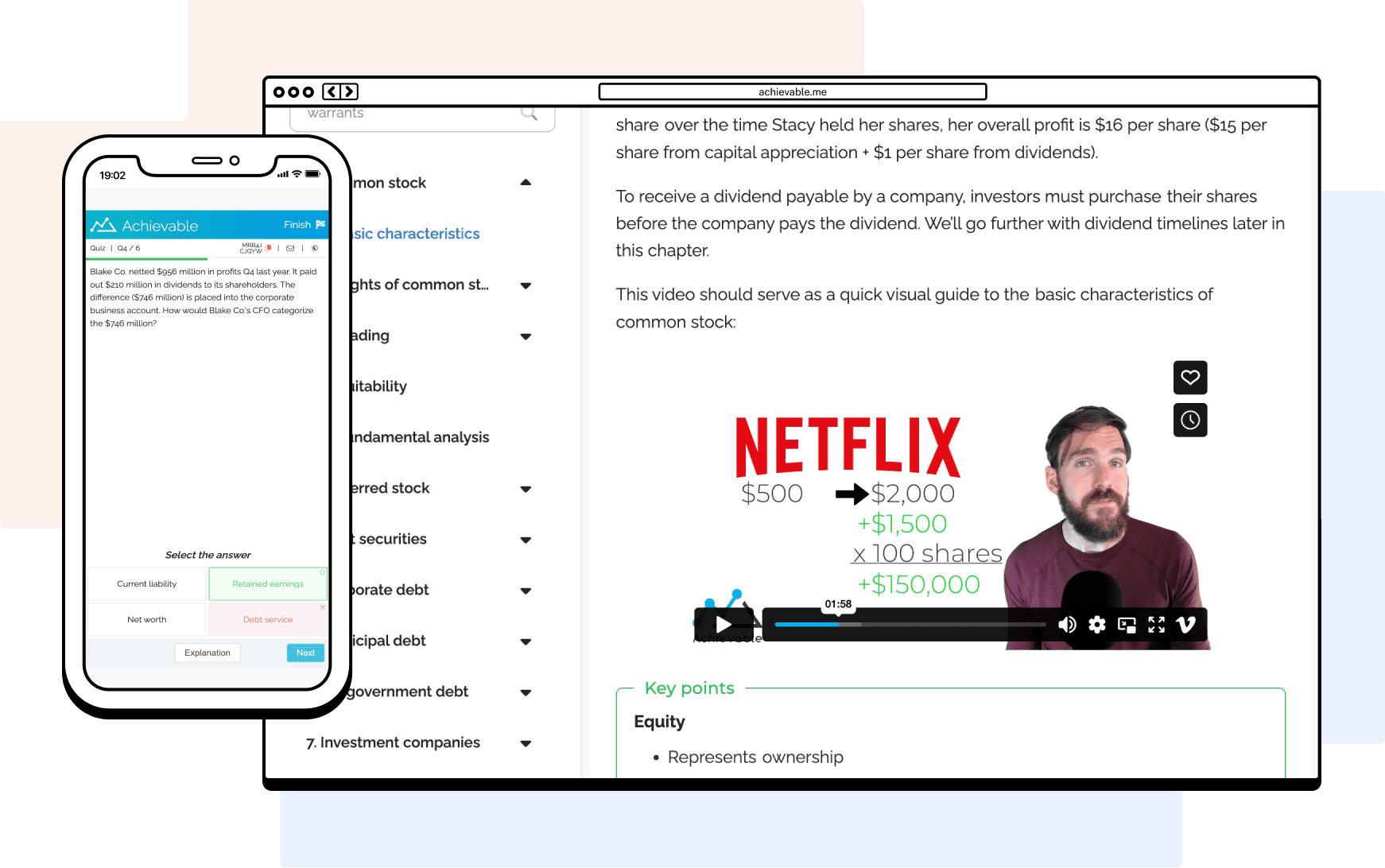
FINRA Series 7Exam information
Exam information
What it is, what's tested, and how it's scored.

Series 7 exam details
The Series 7 exam — the General Securities Representative Qualification Examination (GS) — assesses the competency of an entry-level registered representative to perform their job as a general securities representative.
Also referred to as the Series 7 "Top-Off" Exam. This exam must be passed in conjunction with the Securities Industry Essentials (SIE) Exam in order for the candidate to receive a full General Securities license from FINRA. You must be sponsored by a FINRA member firm in order to take the Series 7.
The Series 7 exam is hosted by FINRA and costs $395 to register. Participants have 3 hours 45 minutes to answer 125 multiple-choice questions. The passing score is 72% (90/125).
Eligibility and sponsorship
Candidates cannot take the FINRA Series 7 Exam or other representative-level qualification exams unless they are associated with and sponsored by a FINRA member firm or other applicable self-regulatory organization (SRO) member firm. For more information on registration requirements, refer to FINRA Rule 1210.
The FINRA SIE Exam is a corequisite to the Series 7 exam. Candidates must pass both the Series 7 exam and the SIE exam to obtain the FINRA General Securities registration. Achievable offers a FINRA SIE Exam course.
For more information on the registration process, see FINRA's Register a New Candidate help page.
Administration of the exam
The Series 7 exam is administered via computer. A tutorial on how to take the exam is provided prior to taking the exam.
Each candidate's exam includes 5 additional, unidentified pretest items that do not contribute toward the candidate's score. The pretest items are randomly distributed throughout the exam. Therefore, each candidate's exam consists of a total of 130 items (125 scored and 5 unscored).
There is no penalty for guessing. Therefore, candidates should attempt to answer all items.
Candidates will be allowed 3 hours and 45 minutes to complete the Series 7 exam.
Candidates are not permitted to bring reference materials to their testing session. Severe penalties are imposed on candidates who cheat or attempt to cheat on FINRA-administered exams.
Scoring of the exam
All candidate test scores are placed on a common scale using a statistical adjustment process known as equating. Equating scores to a common scale accounts for the slight variations in difficulty that may exist among the different sets of exam items that candidates receive. This allows for a fair comparison of scores and ensures that every candidate is held to the same passing standard regardless of which set of exam items they received.

FINRA's Series 7 exam summary
Seeks Business for the Broker-Dealer from Customers and Potential Customers
7%
9 questions
The basics of customer-facing sales activities related to a general securities representative role. What you need to know and do when describing investment products and services to customers with the intent of obtaining their business.
Opens Accounts after Obtaining and Evaluating Customers' Financial Profile and Investment Objectives
9%
11 questions
The rules and processes you must follow when opening a customer account and informing them of their options. Also includes the requirements to make reasonable efforts to obtain customer profile information and report anything suspicious.
Provides Customers with Information about Investments, Makes Suitable Recommendations, Transfers Assets and Maintains Appropriate Records
73%
91 questions
The heart of the exam. Covers how you must provide customers with information about their investment options, especially the suitability of investments for them given their profile and goals. This requires being fluent in the risks, benefits, and typical investors of major financial products.
Obtains and Verifies Customers' Purchase and Sales Instructions and Agreements; Processes, Completes, and Confirms Transactions
11%
14 questions
The logistics portion, covering how to obtain quotes, execute orders, and how to enlist your supervisor to assist in the resolution of discrepancies, disputes, and errors.

Achievable Series 7 content outline
1
Common stock
All things related to common stock, including share types, settlement, selling short, dividends, stock splits, fundamental, technical analysis, and suitability. Various equity-related investments like ADRs, rights, warrants, and tender offers are also discussed.
2
Preferred stock
Characteristics, features, and suitability of preferred stock. Features covered include callable, convertible, cumulative, and participating. Additionally, this chapter dives into interest rates, their influence in the financial markets, and how interest rate changes affect preferred stock.
3
Bond fundamentals
The foundations of debt securities, which are the most commonly traded investment in the financial markets. Topics covered include interest rates, bond characteristics, the debt markets, yields, and suitability.
4
Corporate debt
Why corporations borrow money, how they do it, and different types of debt securities they offer. Suitability, the bond markets, and bank products like CDs and banker's acceptances are also part of this chapter.
5
Municipal debt
A deep dive into how municipalities (states, cities, and local governments) issue debt securities in order to fund budgets and municipal projects. The new issue process, the municipal markets, and investor suitability are also covered.
6
US government debt
The essentials of securities issued by the U.S. Treasury and federal agencies, including their suitability for investors. Mortgage backed securities like pass through certificates and collateralized mortgage obligations (CMOs) are also examined.
7
Investment companies
What an investment company is, how they operate, and the rules and regulations of the Investment Company Act of 1940. Mutual funds, closed-end funds, exchange traded funds (ETFs), and unit investment trust (UITs) are specifically discussed in detail.
8
Alternative pooled investments
Products that work similarly to investment companies but fall outside their definition, which includes real estate investment trusts (REITs), hedge funds, and direct participation programs (DPPs). DPPs are discussed in detail, specifically focusing on oil & gas and real estate limited partnerships (RELPs).
9
Options
A deep dive into option strategies, which include single leg, hedging, income, straddles, spreads, and non-equity options (index, foreign currency, yield, and VIX). Suitability, the options market, and applicable regulations are discussed as well.
10
Taxes
How taxes influence investment outcomes. Topics covered include cost basis, sales proceeds, accretion, amortization, and taxes on options.
11
The primary market
Focusing on the characteristics and regulations of the primary market. The rules of the Securities Act of 1933 are covered in detail, which include IPO rules, exemptions, and the registration process.
12
The secondary market
The essentials of the secondary market, which is governed by the Securities Exchange Act of 1934. Specific stock markets, participants in the financial markets, order types, and applicable regulations are all covered.
13
Brokerage accounts
How brokerage accounts work, the process of opening one, and the different types of accounts available. Cash accounts, margin accounts, fiduciary accounts, and rules relating to firms offering brokerage accounts are covered in detail. Advanced margin strategies and calculations are also discussed.
14
Retirement and education plans
The structures of ERISA-governed qualified and non-qualified retirement plans. Additionally, education plans (Coverdell ESPs and 529s) and ABLE accounts are covered. Contribution limits, penalties, and suitability for specific retirement and education plans are further discussed.
15
Rules and ethics
The do's and don'ts of finance, specifically relating to registered representatives. Public communications and penalties for FINRA rule violations are also covered.
16
Suitability
High level review of suitability standards when making recommendations to clients. Product summaries, investment objectives, investor profiles, best practices when making recommendations, and test taking skills.

Pass the FINRA Series 7. Guaranteed.
Achievable is the best Series 7 exam prep course: effective, personalized, and convenient. With Achievable, you'll spend less time studying and pass your exam the first time, or your money back.